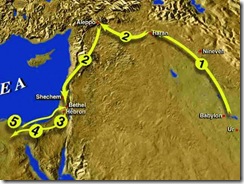English Language Bible Study Guide for January 28, 2008
Genesis 16
"Call me Ishmael." Was Herman Melville thinking about Abram, Sarai and Hagar when he penned these opening words to his now famous Moby Dick?
1-3: After 10 years in the land of Canaan without a child and with no visible prospects of having God’s covenant promises fulfilled, Sarai conceives a solution to her barrenness. Abram agrees.
4-6: Hagar, Sarai’s personal servant, does become pregnant; and the relationship between her and Sarai becomes strained.
7-12: The angel of the Lord speaks to the outcast and expecting Hagar; and he tells her to return to Sarai’s employ with the assurance the child to be born will be the first of a long line of descendants, but with the sad news that he shall be a social outcast.
13-14: Hagar has special names for the one who spoke to her and for the place where they met.
15-16: She returns to Abram and Sarai; and Ishmael is born (and named) as the angel had instructed.
Meditation Points:
- Employer-employee relations
- Foreign workers
- Mistreating domestics
- The extremes to which some go in their desire to be a parent
- Trying to fulfill prophecy on our own
- Blaming others for our sins
- Listening to the bad advice of those we love
- Continuing the pregnancy when we know that the child will be born with problems
Genesis 17
Thirteen years later, God speaks again of His covenant to Abram.
1-3: God introduces Himself as God Almighty, El-Shaddai. Abram, now age 99, is told to walk before God and be perfect.
4-6: God changes Abram’s name to Abraham to signify that he will be the father of many nations and kings.
7-14: God instructs Abraham concerning circumcision, which is to be a token of God’s covenant.
15-22: God clearly states that the covenant child will be the son of Abraham and Sarah (her new name from God); Ishmael will be blessed, but Sarah’s child, to be born within a year and named Isaac, will be the child of the promise.
23-27: Abraham obeys and sees that all the males of his house over 8 days old, whether born into Abraham’s household or bought, are circumcised.
Meditation Points:
- God works in and with older people, too
- Omnipotence, found only in God
- God’s one-sided covenant
- Falling/bowing/humbling ourselves before God
- God’s name for His chosen ones
- The significance of names–what do names mean?
- Circumcision–for whom and why?
- The consequences of disobedience: what is it to be cut off from God’s people?
- When God rejects our efforts to help His cause
- Believers who laugh at God’s promises
- Obeying God, even when it hurts
[print_link]

 Ελληνικό Site
Ελληνικό Site